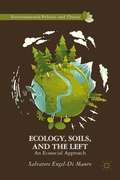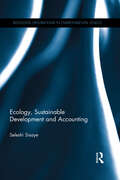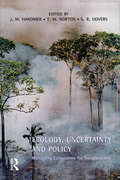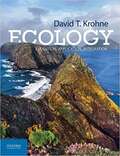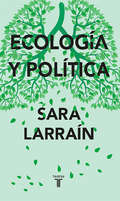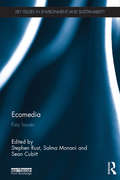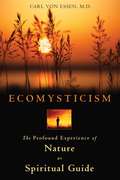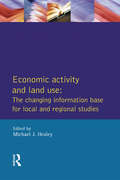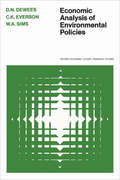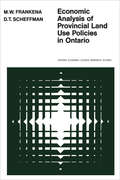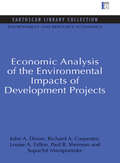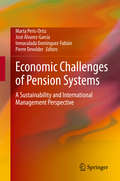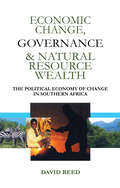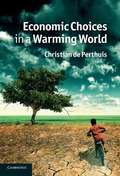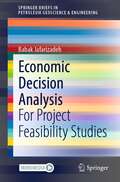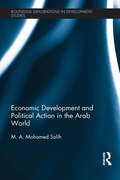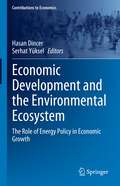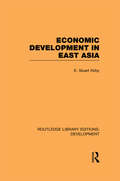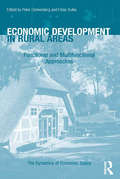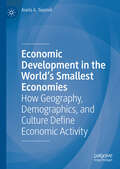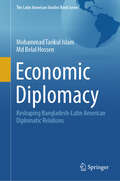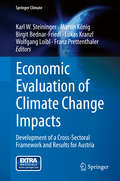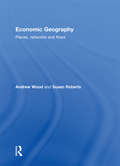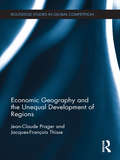- Table View
- List View
Ecology, Soils, and the Left
by Salvatore Engel-Di MauroSoil degradation is real and global, even if the evidence is not so easy to glean. Degradation poses comparable risks to greenhouse gas emissions, deforestation, and nonhuman animal extinctions. Few have noticed soil degradation as the problem it has become, except most indigenous peoples in their struggles for survival.
Ecology, Sustainable Development and Accounting (Routledge Explorations in Environmental Studies)
by Seleshi SisayeAccounting literature has viewed sustainability in terms of social, economic and environmental performances. There have been concerns that the relationship between sustainability, accounting and organizational performance cannot be explained unless we can deduce patterns of administrative behaviour that chronicle management practices. Ecology, Sustainable Development and Accounting argues that, despite the broader social and economic development dimensions of sustainability and the limitations of its extension to corporate and organizational behaviour; an ecological framework is capable of providing the overall societal and community chronologies that describe corporate sustainable operations. Drawing examples from international development and federal government organizations, this book documents the link between ecology, corporate sustainable development, and sustainability accounting and reporting. It draws together the literature from several disciplines to elaborate the contribution of the ecological approach to sustainable development in the accounting literature. This book will be of particular interest to students, academics and practitioners in the areas of environmental studies, ecological economics, sustainable development studies, and social and environmental accounting. The sociological and anthropological perspectives make this book the first of its kind to apply the population ecology of sociology to both the sustainability and accounting literature.
Ecology, Uncertainty and Policy: Managing Ecosystems for Sustainability
by John HandmerA broad and comprehensive exploration of the role of the ecological sciences in sustainability for undergraduates.The urgent quest for more sustainable patterns of development has placed new and difficult demands on both scientists and policy makers as they seek to establish more informed and effective policy processes and management regimes in the the face of pervasive uncertainty. Written by an international group of authors from a range of disciplines - ecology, geography, law, policy analysis and others - the chapters explore issues of scientific legitimacy, public participation, non-governmental organisations, inter-sectoral communication and pragmatic public policy across a wide range of ecosystem management contexts.
Ecology: Evolution, Application, Integration
by David T. KrohneEcology: Evolution, Application, Integration provides students and instructors with a groundbreaking evolutionary approach that transforms ecology from a collection of disassociated facts into an integrated, concept driven discipline. Since most ecological interactions are rooted in adaptive evolution, students learn to place ecological problems in an evolutionary context, thinking critically instead of just memorizing facts. This text develops scientific reasoning skills by teaching students not just what we know about the field, but also how we know what we know about it. <p><p> Each chapter of Ecology begins with a fundamental ecological question. The sections of the chapter are designed around a logical sequence of smaller questions, the answers to which eventually enable students to answer the chapter's main question. This approach models the process of science; as students gain experience with this approach, they can apply it to new problems and questions. <p><p> Ecology: Evolution, Application, Integration is distinguished by the following approaches: Integrates modern evolutionary theory throughout <p>Highlights applications and connections to the real world <p>Emphasizes inquiry, critical thinking, and the process of science <p>Presents quantitative topics clearly and in real world applied contexts
Ecología y política
by Sara LarraínUna breve y útil exposición de la historia y las principales corrientes ecologistas, desde Platón a nuestros días El cambio climático ha sido generado por nuestra forma de habitar la Tierra: por nuestros patrones de producción y consumo basados en combustibles fósiles —carbón, petróleo y gas—, por la doctrina económica dominante y globalizada —sobre todo por sus modelos de negocios—, y por el extractivismo desatado sobre todos los recursos naturales y ecosistemas del planeta. La emergencia climática, cuya más drástica amenaza es el calentamiento global y el fin de las aguas y los bosques como hoy los conocemos, ya está afectando gravemente a todos los pueblos y comunidades que dependen en forma directa de la naturaleza y se aproxima a devastar las formas de vida urbanas. Ante este escenario, la destacada ambientalista chilena Sara Larraín, discípula de Gastón Soublette, quien durante décadas se ha dedicado a enseñar los fundamentos filosóficos del pensamiento ecologista, ofrece un conciso y fundamental ensayo de divulgación filosófica. La actualidad del problema, ante el catastrófico escenario global, supone una oportunidad única para aquellos que, alarmados ante el cambio climático, desean introducirse con urgencia en las raíces del pensamiento medioambiental.
Ecomedia: Key Issues (Key Issues in Environment and Sustainability)
by Sean Cubitt Stephen Rust Salma MonaniEcomedia: Key Issues is a comprehensive textbook introducing the burgeoning field of ecomedia studies to provide an overview of the interface between environmental issues and the media globally. Linking the world of media production, distribution, and consumption to environmental understandings, the book addresses ecological meanings encoded in media texts, the environmental impacts of media production, and the relationships between media and cultural perceptions of the environment.Each chapter introduces a distinct type of media, addressing it in a theoretical overview before engaging with specific case studies. In this way, the book provides an accessible introduction to each form of media as well as a sophisticated analysis of relevant cases. The book includes contributions from a combination of new voices and well-established media scholars from across the globe who examine the basic concepts and key issues of ecomedia studies. The concepts of "frames," "flow", and "convergence" structure a dynamic collection divided into three parts. The first part addresses traditional visual texts, such as comics, photography, and film. The second part of the book addresses traditional broadcast media, such as radio, and television, and the third part looks at new media, such as advertising, video games, the internet, and digital renderings of scientific data. In its breadth and scope, Ecomedia: Key Issues presents a unique survey of rich scholarship at the confluence of Media Studies and Environmental Studies. The book is written in an engaging and accessible style, with each chapter including case studies, discussion questions and suggestions for further reading.
Ecomysticism: The Profound Experience of Nature as Spiritual Guide
by Carl Von EssenExplores the philosophy, science, and spirituality of nature mysticism and its Green calling • Offers a solid bridge between spiritual practice and environmental activism • Reveals how we can heal the environment by renewing our connection to it • Shows how spiritual encounters in nature are healing the Nature Deficit Disorder of our psyches and bodies Many have been struck by a majestic moment in nature--a sole illuminated flower in a shady grove, an owl swooping silently across a wooded path, or an infinitely starry sky--and found themselves in a state of expanded awareness so profound they can feel the interconnectedness of all life. These trance-like moments of clarity, unity, and wonder often incite a call to protect and preserve the earth--to support Nature as she supports us. Termed “nature mysticism,” people from all cultures have described such experiences. However, the ever-increasing urbanization of the world’s population is threatening this ancient connection as well as the earth itself. In Ecomysticism, Carl von Essen explores nature mysticism through the recorded experiences of outdoor enthusiasts as well as scientific studies in biology, psychology, and neuroscience. Citing consciousness scholar William James and a variety of well-known nature lovers such as Ansel Adams, Henry David Thoreau, and Ralph Waldo Emerson, von Essen shows how the spiritual transcendence from an encounter in nature--like other mystical experiences--is healing the Nature Deficit Disorder of our psyches and bodies, leading to an expansion of our worldview and a clearer understanding of our self and of our natural world. Offering a solid bridge between spiritual practice and environmental activism, von Essen’s spiritual ecology reveals how only through a renewal of humanity’s spiritual connection to nature can we effect true environmental healing.
Economic Activity and Land Use The Changing Information Base for Localand Regional Studies
by Michael J. HealeyConcerned primarily with statistical data, this text aims to provide a guide to the nature, uses, availability and limitations of the main data sources for interpreting and undertaking regional studies of economic activity. It also considers the methods used for the collection of this data.
Economic Analysis of Environmental Policies
by C. K. Everson Donald Dewees William SimsA framework is concisely presented for the economic analysis of pollution problems and for evaluating proposed solutions. The substantial recent literature on environmental economics is reviewed and related to Ontario environmental policy. Topics include the theory of externalities as an explanation of environmental problems, policy objectives, costs of information and monitoring, and the impact of these costs on control policy selection. Three case studies of specific pollution problems – sulphur dioxide from a smelter, lead from downtown factories, and urban automobile emissions – are given, and possible solutions explored. The authors' methodology is applicable not only to air and water pollution but also to noise, aesthetic degradation, and solid waste. This study will be welcomed by specialists, civil servants, and students trying to understand the economic aspects of environmental maintenance.
Economic Analysis of Environmental Policy
by Ross MckitrickThe relationship between economic growth and the environment is at the forefront of public attention and poses serious challenges for policymakers around the world. Economic Analysis of Environmental Policy, a textbook for advanced undergraduate and graduate courses, provides a rigorous and thorough explanation of modern environmental economics, applying this exposition to contemporary issues and policy analysis.Opening with a discussion of contemporary pollution problems, institutional players and the main policy instruments at our disposal, Ross McKitrick develops core theories of environmental valuation and optimal control of pollution. Chapters that follow cover issues like tradable permits, regulatory standards, emission taxes, and polluter liability as well as advanced topics like trade and the environment, sustainability, risk, inequality, and self-monitoring. Throughout, McKitrick uses clear, intuitive, and coherent analytical tools, so that students, academics, and practitioners can develop their policy analysis skills while comprehending the debates and challenges at the frontier of this exciting and rapidly-developing field.
Economic Analysis of Provincial Land Use Policies in Ontario
by Mark W. Frankena David T. ScheffmanThis book describes and analyses the provincial government's role in municipal and regional planning. The conversion of farmland to urban and other uses is discussed, as are the issues raised by the reports of the Ontario Planning Act Review Committee and the Federal/Provincial Task Force on the Supply and Price of Serviced Residential Land and the province's Green Paper on Planning for Agriculture. The authors criticize the government's failure to conduct cost-benefit studies before setting up planning programs and show that there is little factual basis for recent alarm over the disappearance of farmland. Data gathered here for the first time show that the conversion of agricultural land to built-up urban use and non-farm rural residential use in Ontario has been taking place quite slowly in view of the rate of productivity increase in agriculture, the stock of agricultural land, and the decline in the acreage of census farms. Economists will find in this book a useful survey of recent trends and policies. Planners, policy-makers, and students will welcome this detailed case study of how economic analysis ought to be used in formulating land use policies.
Economic Analysis of the Environmental Impacts of Development Projects (Environmental and Resource Economics Set)
by John A. Dixon Richard A. Carpenter Louise A. Fallon Paul B. Sherman Supachit ManipomokeIt has always been thought that some level of pollution and waste is unavoidable in development projects. But no one has made much effort to quantify and assess the extent of this sort of damage. In this book a group of analysts from the Asian Development Bank and from the East West Center propose a means of constructing useful economic evaluations of the impacts of development projects on the environments in which they are constructed. This study demands the systematic evaluation of all the intentional and unintentional consequences of development initiatives before they are determined upon. It is essential reading for development economists, analysts and bankers. Originally published in 1986
Economic Challenges of Pension Systems: A Sustainability and International Management Perspective
by Pierre Devolder Marta Peris-Ortiz José Álvarez-García Inmaculada Domínguez-FabiánThis book examines the major economic challenges associated with the sustainability of public pensions, specifically demographic change, labor-market relations, and risk sharing. The issue of public pensions occupies the political and economic agendas of many major governments in the world. International organizations such as the World Bank and the OECD warn that the economic changes driven by an aging society negatively affects the sustainability of pension systems. This book analyzes different global public pension systems to offer policies, methods and tools for sustainable public pensions. Real case studies from France, Sweden, Latin America, Algeria, USA and Mexico are featured.
Economic Change Governance and Natural Resource Wealth: The Political Economy of Change in Southern Africa
by David ReedThis volume analyzes the ways in which natural resource wealth has shaped authoritarian political regimes and statist economic systems in the countries of southern Africa in the post-colonial period. It consists of five essays. The first sets out the historical framework and emergence of natural resources as the crucial driver of economies in sub-Saharan Africa. Three essays, drawing on in-country research, focus on Tanzania, Zambia and Zimbabwe. They show how this explains the economic evolution of those countries - in particular, the impacts of economic and institutional changes on the bulk of the population, the rural poor. The final essay explores the nature of the changes and their neoliberal economic context, and the ways in which their harmful consequences might be relieved.
Economic Choices in a Warming World
by Michael Westlake Christian De PerthuisSince the publication of the Stern Review, economists have started to ask more normative questions about climate change. Should we act now or tomorrow? What is the best theoretical carbon price to reach long-term abatement targets? How do we discount the long-term costs and benefits of climate change? This provocative book argues that these are the wrong sorts of questions to ask because they don't take into account the policies that have already been implemented. Instead, it urges us to concentrate on existing policies and tools by showing how the development of carbon markets could dramatically reduce world greenhouse gas (GHG) emissions, triggering policies to build a new low-carbon energy system while restructuring the way agriculture interacts with forests. This provides an innovative new perspective on how a post-Kyoto international climate regime could emerge from agreements between the main GHG emitters capping their emissions and building an international carbon market.
Economic Decision Analysis: For Project Feasibility Studies (SpringerBriefs in Petroleum Geoscience & Engineering)
by Babak JafarizadehThis book discusses the art and science of economic decision making. It combines logical thinking with analytics, economics, and finance to draw decision insights for the upstream petroleum projects. The book offers useful analysis skills for practitioners in industry, including analysts, engineers, and managers. In addition, advanced undergraduate and graduate students in petroleum engineering, applied petroleum geoscience, industrial engineering, and energy business would benefit from the discussions in this book.
Economic Development and Political Action in the Arab World (Routledge Explorations in Development Studies)
by M.A. Mohamed SalihAnalysis of North African revolt against authoritarianism, known as the ‘Arab Spring’, embraced reductionist explanations such as the social media, youth unemployment and citizens’ agitations to regain dignity in societies humiliated by oppressive regimes. This book illustrates that reductionist approaches can only elucidate some symptoms of a social problem while leaving unexplained the economic and political structures which contributed to it. One outcome of quiescence, resource-based ethnic and sectarian conflicts and faulty development paradigm is deepened inequality and a wedge between winners and losers or affluence, wealth and power vis-à-vis poverty and hunger among humiliated jobless and hope-less masses. The book blends theories of development and transition to explain the complex factors which contributed to North Africans’ revolt against authoritarianism and its long-term consequences for political development in the Arab World. This timely book is of great interest to researchers and students in Development Studies, Economics and Middle Eastern Studies as well as policy makers and democracy, human rights and social justice activists in the Arab world.
Economic Development and the Environmental Ecosystem: The Role of Energy Policy in Economic Growth (Contributions to Economics)
by Hasan Dincer Serhat YükselThis volume illustrates the relationship between environmental factors and economic development of countries from various angles. Global warming has become a problem that threatens the whole world, especially in recent years. It is known that the main reason for this is carbon emissions. On the other hand, carbon emissions generally consist of fossil fuel-based energy consumption. This situation creates very serious environmental problems. Because of this problem, the concept of carbon zero has become very popular, especially in recent years. Many countries take some actions to minimize carbon emissions. Especially in the coming years, carbon emissions will become a competitive factor for countries and businesses. In this respect, countries with low carbon emissions will be preferred more in foreign trade. In addition, businesses that do not generate carbon emissions in the production process will also gain a significant competitive advantage in international trade. The contributions take a multidimensional outlook to energy investments and offer solutions for decision-making for energy projects in risky business ecosystems.
Economic Development in East Asia (Routledge Library Editions: Development)
by E. Stuart KirbyFirst published in 1967, this influential study reviews the economic development of 15 countries from East Asia in the period between 1945 and 1965. It deals with a wide variety of factors influencing the development of the region, including the influence of foreign governments (both international aid and foreign trade); population development; industrialisation; transport and communication infrastructure; and the impact of economic development upon the population of East Asia.
Economic Development in Rural Areas: Functional and Multifunctional Approaches (The Dynamics of Economic Space)
by Elmar Kulke Peter DannenbergAnalysing the ongoing changes and dynamics in rural development from a functional perspective through a series of case studies from the global north and south, this volume deepens our understanding of the importance of new functional and multifunctional approaches in policy, practice and theory. In rural areas of industrialized societies, food production as a basis for growth and employment has been declining for many decades. In the Global South, on the other hand, food production is still often the most important factor for socio-economic development. However, rural areas both in the industrialized north and in the global south are facing new challenges which lead to significant changes and threats to their development. New forms of food production, but also new functional (e.g. housing or business parks) and often multifunctional approaches are being discussed and practiced yet it remains unclear the extent to which these result in better or more sustainable development of rural areas.
Economic Development in the World's Smallest Economies: How Geography, Demographics, and Culture Define Economic Activity
by Aneta A. TeperekThis book examines three fundamental factors that influence the economic growth and development of the world's 93 smallest economies, which together produced 1% of global GDP. The objective of the study is to ascertain whether the countries analysed possess the requisite environmental resources, human capital, and cultural conducive to economic development, and whether they effectively utilize their resources. Consequently, the location and elements of physical geography are analyzed, including climate, soils, landforms and geological structure from the perspective of mineral resources abundance as well as marine and inland water from the perspective of water resource abundance. The changes in population from 1970 to 2019 are studied and the factors determining them, which are natural increase and migration. Finally, the demographic structure are examined. The analysis of cultures, including religions and languages, is undertaken to identify cultural factors that either support or hinder economic growth and development. This book is designed for students and researchers engaged in the study of economic geography, geography, demography, and macroeconomics. It serves as a valuable resource for international organizations engaged in the analysis of countries across the globe.
Economic Diplomacy: Reshaping Bangladesh-Latin American Diplomatic Relations (The Latin American Studies Book Series)
by Mohammad Tarikul Islam Md Belal HossenEconomic diplomacy has become more notable in recent years, helping developing nations like Bangladesh maximise their national interests. Bangladesh is rapidly transitioning from a low-income to a middle-income nation, with the goal of reaching developed status by 2041. Bangladesh engages in international trade with almost every country. Nevertheless, a considerable amount of global trade demonstrates a strong reliance on specific nations. Decreasing trade dependence is required to transition from an emerging economy to a high-income, financially independent nation. Having gained its independence more than 50 years ago, Bangladesh has been slow to form bilateral partnerships and expand its economic activity. Consequently, Bangladesh remains dependent on China and India for imports, while focusing on America and Europe for exports. As a result of this economic interdependence, the dominant global powers enjoy the potential to pursue a proactive stance in the domestic affairs of Bangladesh. By taking steps to decrease its dependency on conventional trading partners, Bangladesh can increase the emphasis on non-traditional trading partners like Latin American and African countries. The formation and growth of a comprehensive economic diplomacy framework is required in this context. The aforementioned reasons generated the idea for a research investigation of Bangladesh's economic diplomacy with Latin America. Argentina now wishes to reopen their embassy in Bangladesh, spurred on by the extraordinary support the people of Bangladesh have shown for their country during the World Cup. In an effort to establish a Mexican embassy in Dhaka, Mexican Foreign Minister Marcelo Ebrard Casaubon is expected to visit the city in March as part of a high-level group. This study shows that geographical distance and cultural differences do not have a substantial impact on building a market position in the Latin American region. Promoting Bangladesh through public diplomacy in the region can assist the country in increasing its portion of international trade. However, this requires a suitable framework for Economic Diplomacy. The book examines prospective economic diplomacy methods for Bangladesh. This book offers fresh perspectives on various facets of Bangladesh's expanding trade relations with Latin America.
Economic Evaluation of Climate Change Impacts
by Birgit Bednar-Friedl Karl W. Steininger Martin König Lukas Kranzl Wolfgang Loibl Franz PrettenthalerThis volume deals with the multifaceted and interdependent impacts of climate change on society from the perspective of a broad set of disciplines. The main objective of the book is to assess public and private cost of climate change as far as quantifiable, while taking into account the high degree of uncertainty. It offers new insights for the economic assessment of a broad range of climate change impact chains at a national scale. The framework presented in the book allows consistent evaluation including mutual interdependencies and macroeconomic feedback. This book develops a toolbox that can be used across the many areas of climate impact and applies it to one particular country: Austria.
Economic Geography
by Andrew Wood Susan RobertsThe turbulence of the current times has dramatically transformed the world's economic geographies. The scale and scope of such changes require urgent attention. With intellectual roots dating to the nineteenth century, economic geography has traditionally sought to examine the spatial distributions of economic activity and the principles that account for them. More recently, the field has turned its attention to a range of questions relating to: globalization and its impact on different peoples and places; economic inequalities at different geographic scales; the development of the knowledge-based economy; and the relationship between economy and environment. Now, more than ever, the changing fortunes of peoples and places demands our attention. Economic Geography provides a stimulating and innovative introduction to economic geography by establishing the substantive concerns of economic geographers, the methods deployed to study them, the key concepts and theories that animate the field, and the major issues generating debate. This book is the first to address the diverse approaches to economic geography as well as the constantly shifting economic geographies on the ground. It encompasses traditional approaches, albeit from a critical perspective, while providing a thorough, accessible and engaging examination of the concerns, methods and approaches of the 'new economic geography'. This unique introductory text covers the breadth of economic geography while engaging with a range of contemporary debates at the cutting-edge of the field. Written in an accessible and lucid style, this book offers a thorough and systematic introductory survey. It is enhanced by pedagogical features throughout including case studies dealing with topics ranging from the head office locations of the Fortune 500, Mexico's maquiladoras to China's investments in Southern Africa. This book also contains exercises based on the key concepts and annotated further reading and websites.
Economic Geography and the Unequal Development of Regions (Routledge Studies in Global Competition)
by Jacques-François Thisse Jean-Claude PragerBehind the mystery of economic growth stands another mystery: why do some places fare better than others? Casual evidence shows that sizable differences exist at very different spatial scales (countries, regions and cities). This book aims to discuss the main economic reasons for the existence of peaks and troughs in the spatial distribution of wealth and people, with a special emphasis on the role of large cities and regional agglomerations in the process of economic development.
